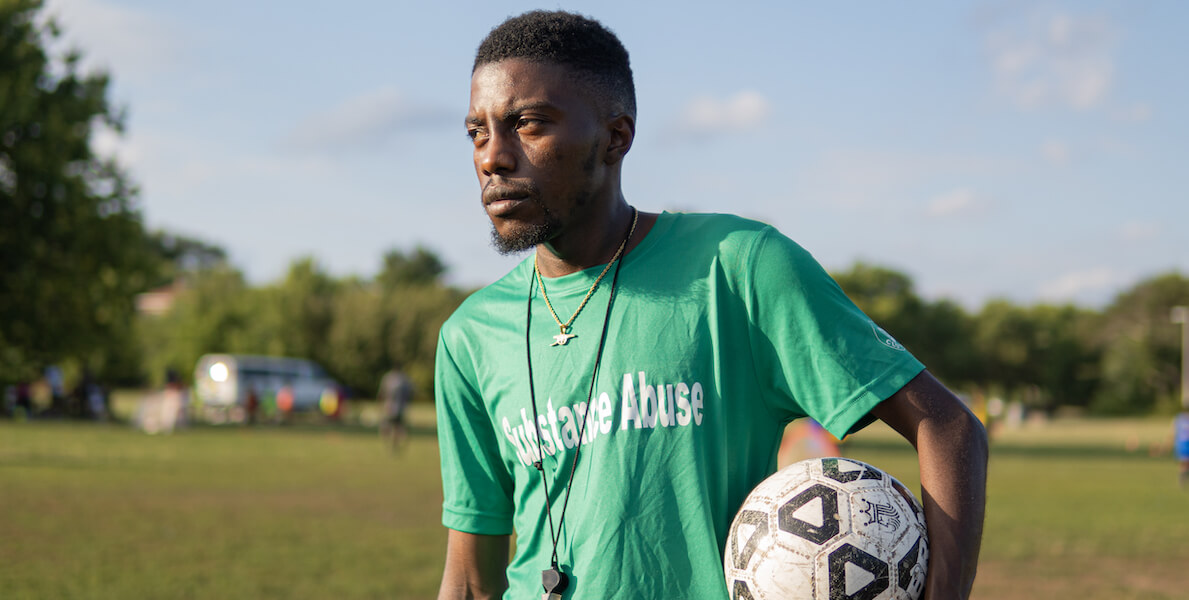On a molasses humid July night in Suffolk Park in Eastwick, the smell of charred food wafts through the air and throbbing Afro-techno music pumps from dual subwoofers as 200-plus fans gather to grill and watch back-to-back Sunday matches.
They are — and I am — here because this is not just any Sunday league match. It’s an elite men’s tournament organized by Foday Nwankwo, a muscled, affable Sierra Leonean leader in Philly’s African soccer community. The games today are played with fervor and passion. It’s abundantly clear even to me, a first-time spectator, that those on the field and along the sidelines pulse deeply with a passionate love of the game and pride in their community.
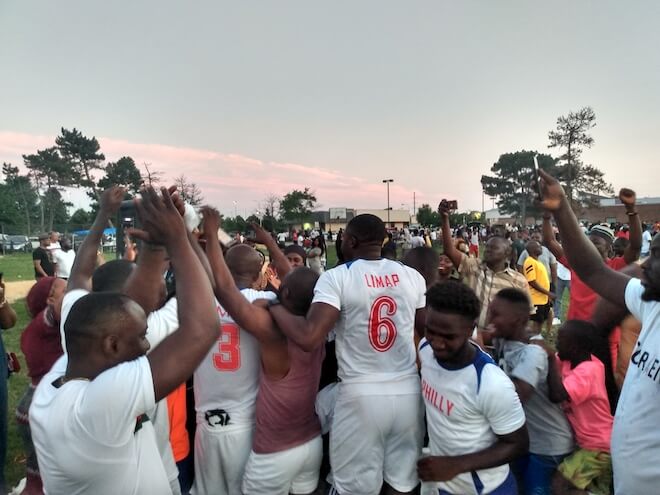
The crowd spans generations. Wives, friends, children, and grandparents vie for a good view. With every shoulder collision, every sprint in the mud, the collective bated breath after every shot, you feel the love. You also feel it as Nwankwo presents the trophy for and speaks to the immigrant community that calls this Southwest Philly park home.
The needs are great, but Samuel Cole is willing to start with small, lower-budget improvements. “We need trash cans, man.”
A well-loved community park
“We all migrated here, [and] we all became one. Liberia, Sierra Leone, Kenya … You name it: We’re all the same. We’re all one people. This is just the start for our community. We’ve got a long way to go, a lot of people to thank,” Nwankwo says. “This is our home,” he goes on.
Then he makes a plea: ”It’s better for us to help clean. When you drink … if you see a trash bag, take it and put it in there.” It’s both a message to all present about the shared history that binds them together — as well as a call to simple action: Clean up the park.
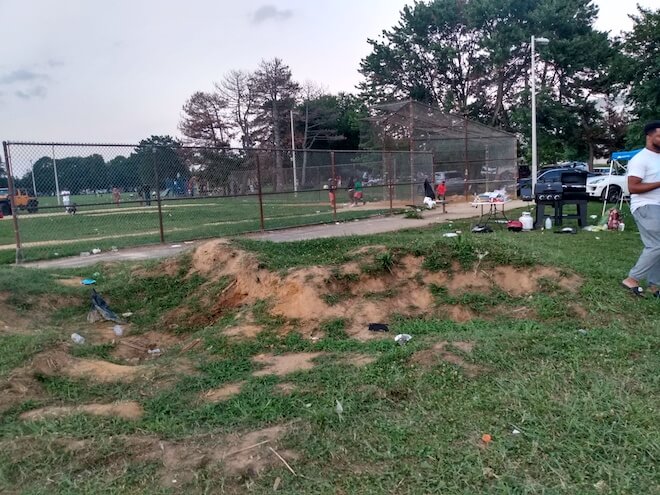
See, Suffolk Park is, well, a mess. It has been for some time. Trash is strewn around the playground. The City says it’s a site of repeat-offense illegal dumping. The park’s basketball hoops hang on by hairs of wood. One droops under a shared backboard. The field is rough, filled with potholes. It’s dangerous to play on this kind of field, a cause for serious concern among players.
The needs are great, but Samuel Cole is willing to start with small, lower-budget improvements. “We need trash cans, man.”
Since 2014, Cole has been a de facto spokesperson for both the Sierra Leonean and African community as a whole. He speaks softly, with unmistakable pride in his community. A few years ago, for the sake of his own child, Cole launched youth soccer programs at Suffolk Park. Today, that program has over 200 players. “I wish you could have seen last week’s six-a side tournament” he beams. “One thing we’re never short of is players. There’s a lot of talent here.”
The dominance of African football in Philly
Many of those young players find inspiration in the older players, who compete every summer in the Unity Cup. Created by Mayor Jim Kenney in 2016 and Parks and Rec, the City-sponsored International Unity Cup features 48 “national” teams, each repping a different country, all celebrating Philadelphia’s diverse communities.
Each year, the Cup has grown. This year’s tournament, which began on August 5, involves more than 1,200 players, 150 coaches, and 79 cumulative matches. It looks a bit like the highly international, much-touted World Cup that’s coming here in four years. Except it’s all Philly. (The Philly tournament’s popularity has led the way for a similar event to be created in Boston, with ongoing efforts underway in Harrisburg and Detroit too.)
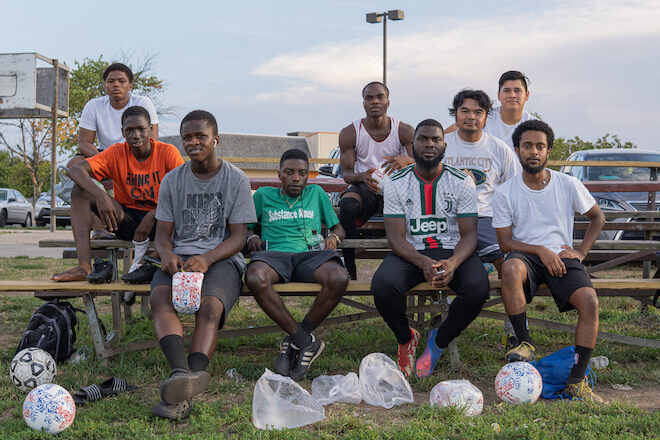
Since the Cup’s inception, the African community has been dominant: Every winning team to date has been African — and all but one of the final matches has been all-African. The Liberian team has won four times. “They’re just that good,” says DuPont Pierre, a coach with the Haitian team. “These dudes will practice outside during the wintertime … It [sometimes] feels like it’s a tournament between [the African teams]—and nobody else.”
“We don’t take off,” says Cole. “For us, it’s not even practice. It’s playing the game we love.”
Their commitment has propelled these teams to success. But it’s also a testament to their origins, a physical celebration of culture, a resounding recognition that beyond Philadelphia, football means something else entirely. Each match played in Suffolk Park honors heritage — and knits the fiber that binds these Philadelphian communities together. This is their park. It is Philadelphian. It is African, and it deserves the respect they themselves deserve.
A cry to the City for help
“For us, the park is a gathering place, it means community,” says Cole. “This is how we do it in Africa. It’s not just [about] soccer … it’s a place where people who work hard five days a week spend their days off, playing the game and hanging out with their community.”
But despite the team’s athletic prowess and pride of place, there has been a lack of improvements to Suffolk Park, their home in Southwest Philly, multiple SEPTA swipes and 90 minutes from Center City. The state of the park — due in large part to a lack of trash cans and irregular waste removal — has gotten so bad that Samuel and others have thought about pulling out of the Unity Cup.
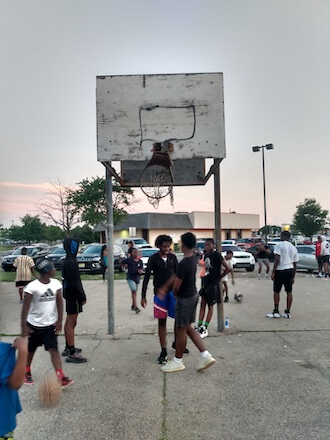
“We’ve considered boycotting the tournament,” he says, citing a lack of follow-through on promises given by City officials over the last couple years to bring funding to the space.
Less than four miles from Suffolk Park, there’s a $225 million makeover underway at FDR Park. By 2026, at the far end of South Philly, a golf course-turned-natural meadows will become home to a dozen, state-of-the-art turf soccer fields. Right now, Latino and Caribbean teams face off on a bumpy pair of grass fields at FDR’s far end. But the location is an impractical alternative, as far as these players and their families are concerned.
“The whole community is not going to travel all the way to FDR Park,” says Cole. “Generally, when immigrants come somewhere, they make the first place they feel comfortable in their home. Why do we have to leave our community to find something nice? In order for kids to play, they have to see the image of success. [But] if kids have to go out [of their area], how can they value their community?” Cole’s neighborhood is home to thousands of African families — many from Sierra Leone, like his, but also from Senegal, Ivory Coast, and, most of all, Liberia — the nationality of those Unity Cup winners.
Maybe instead of giving the tournament’s winners a trophy this year, the City could award them with a half dozen sturdy trash cans, a pair of new basketball hoops, a part-time grounds crew to fix up the field’s ankle-twisting potholes — and a plan for regular cleanups?
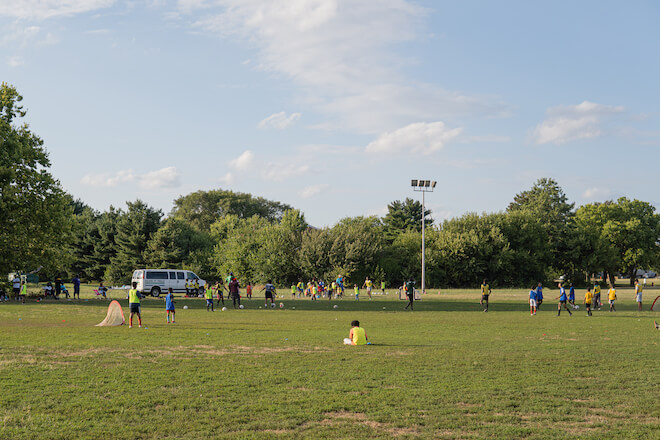
Hope in spite of neglect
It’s not that simple, says Maita Soukop, Director of Communications for Parks and Recreation. “[We’re] aware of the conditions … and [are] working to raise funds for much needed investment in the fields … There are many capital needs across the system.” An estimated 90 percent of the City’s parks — including 159 rec centers, 1,400 fields and courts — currently require some form of financial investment.
Cole recognizes this. “We understand that they’re not just going to improve a park for a single team, just because that team wants it improved. We understand the way that things work in politics. We know that these things take a lot of time. For us, we just focus on what we can do and hope that somebody takes notice. We’re patient.”
On this particular July Sunday, State Representative Regina Young is here, kicking a ball out to the tournament’s organizers to a chorus of clapping spectators. Cole believes Young’s presence is a sign of increasing visibility of the park. “I’m hopeful about the future,” he says.
A longtime resident of the neighborhood, Young has come to the park for years, and has seen its usage change from baseball to soccer in the last 20 years. Young champions the park and others like it for the same reasons that Cole and Foday do: its socio-emotional benefits.
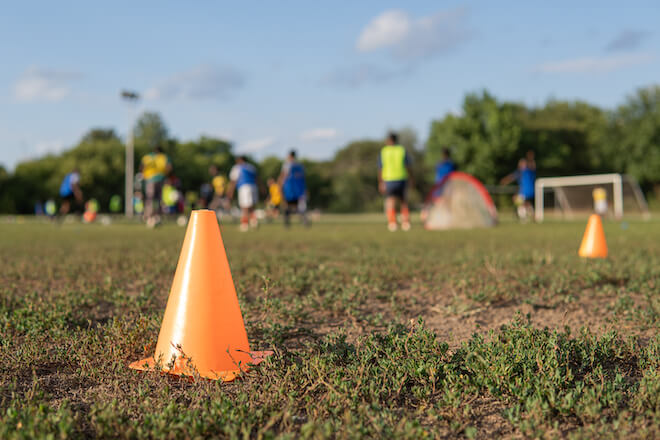
“Parks are spaces that benefit the mental and emotional well being of a community. I stand behind anything [that does that].” Suffolk Park is out of Young’s jurisdiction — city-wise, Eastwick is part of Councilmember Kenyatta Johnson’s district — so she doesn’t have much influence over making improvements.
Instead, she echoes the current sentiment, if not of Parks and Rec or the City that sings praises of its inclusive international tournament, then of Nwankwo, Cole, and everyone else leaning over to pick up remnants of the Sunday cookout and matches. Right now, she says, “It’s everyone’s responsibility.”
And tonight, in the air, is the unmistakable feeling of hope.
![]() MORE ON KIDS, SPORTS, AND PARKS FROM THE CITIZEN
MORE ON KIDS, SPORTS, AND PARKS FROM THE CITIZEN
Samuel Cole. Photo by Theo Wyss-Flamm



